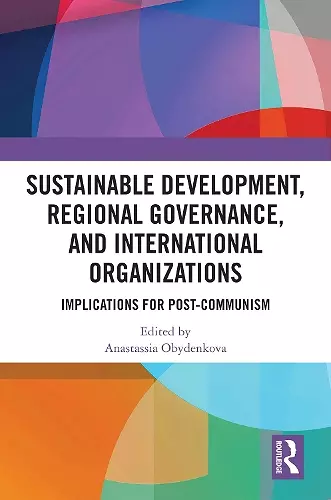Sustainable Development, Regional Governance, and International Organizations
Implications for Post-Communism
Format:Hardback
Publisher:Taylor & Francis Ltd
Published:28th Jun '24
Currently unavailable, and unfortunately no date known when it will be back

This book aspires to establish a dialogue among the studies of sustainable development, global environmental politics, comparative regionalism, and area studies of Eurasia. The chapters in this book reflect deep knowledge of the authors of the main trends in environmental politics at global, international, and national levels before the invasion in Ukraine in 2022. First, the book looks into the role and impact of international organizations such as the European Union (EU), European Bank for Reconstruction and Development (EBRD), Arctic Council (AC,) and Global Forums on Climate Action on post-Communist states, but also the role of nation-states (e.g., Russia, Kazakhstan, and China). Second, the book explores relatively new international organizations, such as the Eurasian Economic Union (EAEU), the Eurasian Development Bank, and the Shanghai Cooperation Organization (SCO). How do the EAEU, EDB, and the SCO matter, if at all, in promoting an environmental agenda? How do the EU, EBRD, and the AC advance the environmental agenda across the post-Communist region? This book aspires to answer these questions and to shed more light on the challenges to sustainable development in post-Communist Europe, Central Asia, and Eurasia.
With a new foreword and afterword, this book will appeal to students, scholars and researchers of political science, international relations, area-studies as well as practitioners and policymakers working in international organizations and dealing with challenges of sustainable development. The other chapters were originally published as a special issue of Problems of Post-Communism.
“This volume is essential reading on how authoritarianism shapes environmental politics through regional governance organizations. The chapters are especially valuable for insights on climate governance in post-communist states – some EU members, and some not – and the influence of major non-democracies like Russia and China. Together these authors set out an important path for future research, showing how variation in domestic regime type may enable or constrain multilateral efforts to address environmental challenges.”
Laura A. Henry, Bowdoin College, USA
“This book provides innovative and much-needed analysis of the roles of authoritarian regional organizations (RO) and democratic regional environmental governance in the post-Communist region. Until now, we have known far too little about the roles of non-democratic ROs in many policy areas, including environmental issues. The authors collectively provide insight into the reasons why autocratic regimes and non-democratic ROs engage with environmental policy areas, finding that reputational concerns and mimicry outweigh sometimes effective policy action. On the hopeful side, the contributors find that civil society groups in the region benefit from resources and information provided by EU environmental bodies, and some post-Communist states learn from the information and strategies gained through participation in global climate forums.”
Lisa McIntosh Sundstrom, The University of British Columbia, Canada
“This book provides a comprehensive examination of the impact of regional international organizations on sustainable development and environmental agendas. Theoretically grounded, it explores both democratic and autocratic environmental regionalism, linking previously separate areas of study to shed new light on the complexities of global environmental politics in a post-communist world.”
Jeronim Perović, The University of Zurich, Switzerland
“This book highlights, among other issues, the important role played by non-Western states in countering climate change and environmental degradation. The chapters show the path toward environmental governance through regional NGOs and global efforts to improve environmental outcomes through policy actions aimed at sustainable development. The authors provide a model of engagement with academic literature in the service of positive policy outcomes.”
Dmitry Gorenburg, Harvard University, USA
ISBN: 9781032743806
Dimensions: unknown
Weight: 453g
158 pages